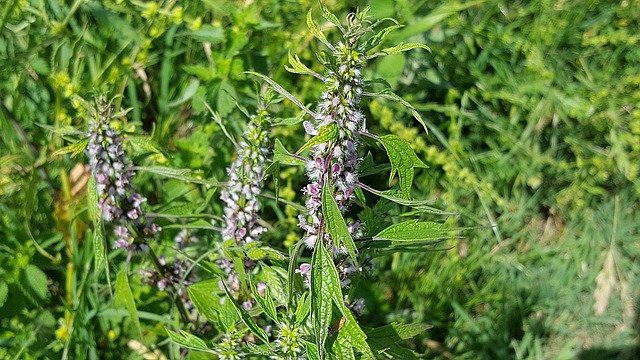 |  |  |  |  |
 |  |  |
Five-lobed motherwort (Leonurus quinquelobatus Gilib) - a perennial plant, 50-150 cm tall, in rare cases up to 200 cm. It has one or more stems. The stem is erect, four-sided, branched, with short curly hairs in the reinforcement. Leaves on stems, arranged oppositely, bright green, grayish underside, covered with hairs. The lower leaves are split in half, five-lobed, the upper three-lobed. Flowers pink, located in upper leaf axils. The plant blooms from June to September. Fruits are nuts.
Motherwort (Leonurus cardiaca L.) - a perennial plant, up to 150 cm tall. The stem is erect, four-sided. Leaves on stems, oppositely arranged, dark green, covered with thick hairs. The lower ones are round or oval, split to the middle of the leaf, five-lobed, the upper ones are simpler. The flowers are pale pink, located in the axils of the upper leaves. It blooms from June to September. Fruits are nuts.
The above-ground part of the plant is used for medicinal purposes. The plant is harvested at the beginning of flowering, harvesting the tops of the plant up to 40 cm long, without cutting the stems thicker than 5 mm. Collect in dry weather, dry in the fresh air, in the shade, in the attic or in forced dryers not exceeding 60C.
The medicinal effect of the plant is determined by its flavonoids, iridoids and alkaloids.
The plant contains alkaloids up to 0.4%: leonurine, leonuridine, stahydrine; choline; saponins, flavonoids: quercetin, rutin, quinqueloside, cosmosin, hyperoside, quercetin, quercetin-7-glycoside, isoquercitin; iridoids: haliridoside, 8- acetylharpahide, ajugoside, ajugol, harpahide; essential oil (up to 0.9%), which includes limonene, linalool, caryophyllene, alpha-humulene and beta-pinene; diterpenes, steroidal glycosides, caffeic acid glycoside, paracoumaric acid, tannins (up to 2.5%), bitter substance marubin, dyes, resins, vitamin C, carotene; macro and micronutrients.
Medicinal significance
The
Motherwort
has a pronounced sedative effect (calming). Plant preparations act as spasmolytic and anticonvulsant agents, reduce the heart rhythm and increase its contraction, have a pronounced hypotensive and cardiotonic effect. The
Motherwort
has a beneficial effect on the carbohydrate and fat exchange process, reduces the content of glucose, lactic acid and pyruvic acid, cholesterol, lipids in the blood and normalizes protein metabolism.
In case of heart failure, the
Motherwort
reduces edema, increases urination, in case of hypertension - lowers blood pressure, relieves headaches, improves sleep and well-being.
Motherwort extract is used as a sedative in cases of nervous tension, early stages of hypertension and sleep disorders.
Iridoids have various properties: immune system stimulating, choleretic, laxative, antimicrobial, fungicidal, antitumor and others, but above all sedative, so these plants are used to create medicines based on natural origin. The iridoids present in the plant enhance the effectiveness of the complex therapy of arterial hypertension, which is accompanied by psycho-emotional disorders, and also allow to reduce the dose of antihypertensive drugs.
The antispasmodic properties of the plant are provided by the effect of flavonoids and iridoids present in the plant. Bitter substances and flavonoids improve digestion and have a choleretic effect; triterpenes have a cardiotonic effect, create antisclerotic activity, enhance the effect of cider glycosides.
According to various authors, motherwort extract acts 2-3 times more strongly on the CNS than valerian extract.
Motherwort
preparations are often more effective than valerian. Motherwort, thanks to rutin, produces a significantly stronger antioxidant effect when compared to hawthorn tincture.
When using maternal preparations, its therapeutic effect appears relatively slowly, so the dose is usually adjusted individually, taking into account the clinical picture of the patient's illness.
In folk medicine, motherwort is used as a strengthening, calming, anthelmintic, reducing the feeling of heaviness in the stomach area, treating impotence and prostate adenoma, and as a diuretic. Externally, it is used to treat trophic ulcers and burns.
Since the thirties of the 20th century, the alcoholic extract of this plant has been used in official medicine as a sedative.
For men
In terms of pharmacological properties, motherwort is close to valerian. In folk medicine, the plant is used to treat impotence, which is caused by problems with the functioning of the CNS. In mixtures with other herbs, motherwort is used to treat prostate adenoma, impotence and premature ejaculation.
